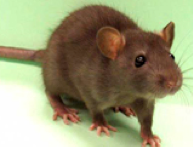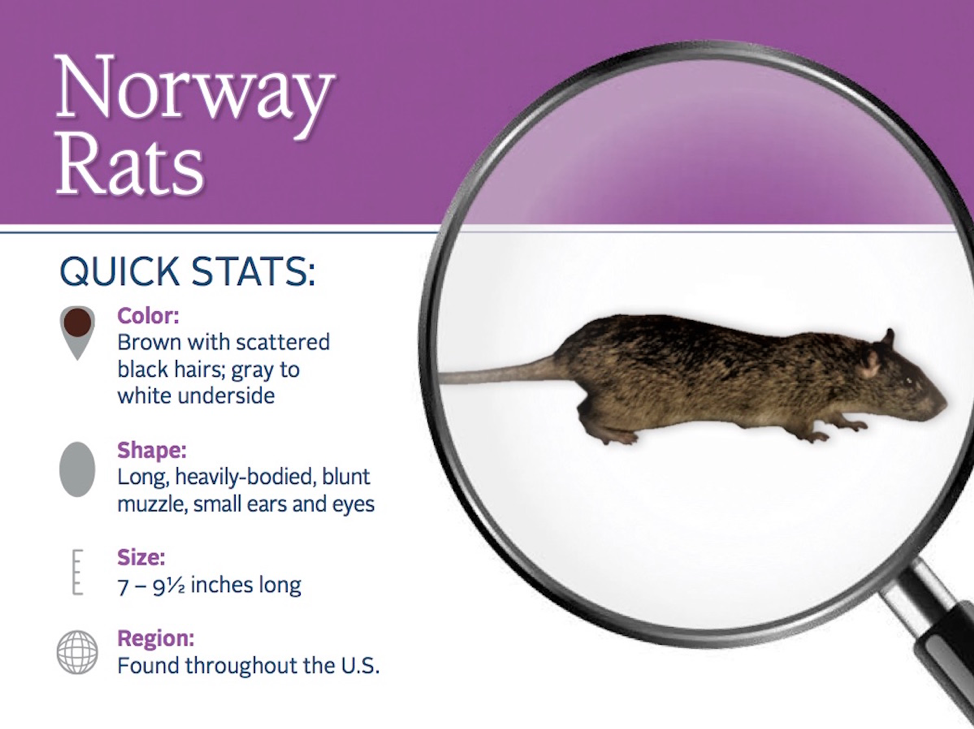
Serving Northeast & Central PA | Lehigh Valley | Pocono Mountains
Rats large nocturnal rodents. They are much larger than house mice and have a much longer tail. The destruction that rats cause far exceeds what house mice can do, even if they are less common. They don’t like change very much, so they are hesitant to enter new home and additions to homes. They usually nest in basements, and will feed on meat, fish, and cereal. Rat infestations are dangerous for homeowners because they can carry many diseases such as leptospirosis, trichinosis and salmonella. If you think you have rats in your home, it’s imperative to address rat activity the moment it’s observed.
What kinds of rats live in Pennsylvania?

The Norway rat is the most common that homeowners and commercial business owners face in our area. Norway rats are very large rodents, measuring 7” to 9 1/2” long with their tail being 6” to 8” brown in color with some black hairs. They usually build nests on the lower levels such as basements, but if the population is too large, they may be found in the attic and ceiling areas. Their nests are built from soft material like paper or grass chewed into small pieces they gather from surrounding areas. Did you know that Norway rats are excellent swimmers? According to Columbia University, migrating rats can swim up to half a mile and survive by treading water for 3 days.
Why do I have rats?
Rats will seek food outside, but many times will come inside at night to forage for food and return to their burrows. They can travel hundreds of feet which could mean that you are suffering from your neighbor’s rat issue. Needing a water source, they can obtain water from toilets, sinks, rain puddles, or condensation from utility pipes. Their nesting burrows on the outside are often along the foundation of walls. As the rat family grows, more burrows are built, resulting in a network of underground tunnels. Outdoors, rats scavenge for fruit from trees growing on your property, and even dog droppings.
How can I tell if I have rats?
Rats are nocturnal, with their peak activity at dusk or before dawn. When the population is large or they are disturbed or hungry, you can see activity during the day. Norway rats will leave a hind foot track of about 3/4-1 inch where a mouse’s track measure’s 3/8 of an inch or less. Rats will also drag their tails, leaving a mark between their feet tracks. Unscented baby powder or flour, lightly sprinkled can help you determine tracks and their runways as they cross suspected areas. They gnaw holes about 2 inches or more in diameter with rough edges to create entry points around your home and into trash cans. Rat burrows can be found along foundations, or beneath rubbish and shrubbery. If the burrow is active it usually clear of vegetation. Rat runways are smooth and well packed. Indoors, these runways are free of dust and dirt.
Why should I be concerned with rats?
Rats may bite or chase you if they feel threatened. Rat-bite fever is a major concern when it comes to rat scratches, bites, or consumption of food that has come into contact with rat droppings or urine. Symptoms of rat-bite fever include rashes on the hands and feed, sore throat, vomiting, fever, and muscle pain. If left untreated, rat-bite fever can cause serious health implications or even death. Rats also pose threats to your health and home by being frequent carriers of ticks and fleas. Fleas that fall off of the rodent can begin breeding in your home, causing an additional unpleasant pest issue. Rats prefer to gnaw on wood in spots such as doors, corners, and ledges, but can damage electrical wiring. This can potentially lead to fire and electric hazards.
How can I get rid of rats?
The best way to avoid a rat infestation is to prevent them from entering in the first place. You can prevent rodent infestations by ensuring that all of the cracks, crevices, gaps, or other vulnerabilities on the exterior of your home are properly sealed. Food that’s stored around your home in easily penetrable containers such as sugar and cereal should be moved to air tight containers. If you find contaminated food, discard it immediately and wash your hands. Ensure that all leaky or broken pipes are repaired. Another step towards rat prevention is to secure your trash can lids.
How does Seitz Bros. get rid of rats?
Home Protection Plans
Our Home Protection Plans provide full coverage for rats and other common household pests, all year-round. Monthly or quarterly service options are available based on your unique needs. Unlimited technician re-visits are available to ensure that your pest problem is under control. Rodent exclusion services are also available to permanently seal your home against further rat infestations.
Fill out the contact form on this page or give Seitz Bros. a call today to set up a free rodent inspection at your home!
What are Rats Pest Control in Pennsylvania & New Jersey?
Serving Northeast & Central PA | Lehigh Valley | Pocono Mountains | Western NJ
